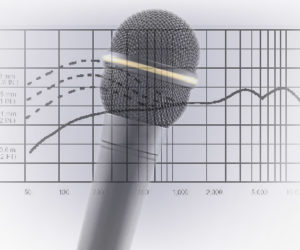As technology accelerates at a dizzying rate and increases in processing power are only rivaled by the size of knobs on “retro analog” gear, we find ourselves navigating between magical-designer patch cables and legitimate advances in audio.
We know digital must always be “better” because CDs sound better than cassette tapes.
Everything is processed, as often as possible, and just as the hot dog is the perfect meal of processed meat, sound will be perfect and consistent any day now, as soon as we buy that magic black box with sufficient DSP power.
In order to help understand where you are in this overwhelming audio maze, I have put together a quiz to help rate your knowledge and personality type.
Modeled after the timeless and successful “Rate Your Love Life!” or “Is He Faithful?” types of quizzes in women’s magazines, it only seems appropriate that we “audiots” should share in the fun.
Your “audio horoscope” should provide some valuable insight into your mixing “character”. To properly score, you must answer every question, and be sure to keep score as you go.
So take your time, read carefully, good luck and enjoy!
1) You are mixing FOH at a venue that has a 90 dB A weighted limit, averaged over 10 minute intervals, maximum 20 dB peaks, measured from the FOH mix position. Which of the following would be a valid approach for achieving the best sounding show?
—Make a point of introducing yourself to the sound monitoring person, find out the rules and show interest in their job – 1 point
—Radio to production for a case of beer and a bottle of Jack – 2 points
—Yell obscenities and stomp around like a little kid – 4 points
—Ignore the irritating sound cop and crank it up – 3 points
—Go back to the bus – 6 points
2) Really old sound gear does not actually sound that great…
—Unless it has tubes, which means that it sounds amazing – 4 points
—Unless it looks cool, which means it sounds amazing – 2 points
—Age is not as relevant as the quality of the design – 5 points
—True – 1 point
3) Huge mics are better because they capture more sound…
—Of course – 4 points
—Especially if they have a tube – 3 points
—No, but they definitely fall over easier on a tripod stand – 6 points
—Yikes – 0 points
4) A large-scale digital console is best suited for…
—Replacing a smaller, lighter, less expensive analog console on a tour that ships worldwide and only one engineer uses it – 7 points
—A rental company to put on festivals so all the engineers can share one console and learn to use it at the same time – 4 points
—Award shows with multiple acts and cues and the producers won’t let the band engineers touch the consoles anyway – 1 point
—All of the above because it will make the band sound better – 4 points
5) When mixing a show you…
—Lean over the console constantly turning knobs and must not be disturbed – 5 points
—Dial up the mix, hit your cues and make minor adjustments during the show – 1 point
—Drink beer and hang out with your friends – 6 points
—Watch the band intently because you are a monitor engineer – 0 points
6) A friend once told me “when mixing, never face an audience of 10,000 people without a beer and a cigarette”, his advice means…
—You should take up smoking and drinking while you work – 2 points
—Mix with your feet – 4 points
—Never panic, a relaxed and confident engineer will mix a better show – 1 point
—May as well enjoy yourself because the band can’t hear your mix or see you anyway – 6 points
.7) Before your show starts you…
—Hang with your friends and drink beer – 6 points
—Do a quick check to make sure all is in order – 1 point
—Change into your “show clothes” – 2 points
—Turn everything up a bit, just in case – 7 points
—All of the above – 0 points
8) Feedback from stage…
—Usually builds quicker and more aggressively than feedback from the mains – 5 points
—Is the only place it comes from – 3 points
—Is the only chance for the monitor engineer to get in a “solo” – 2 points
9) Studio gear is better than live sound gear because…
—It usually costs more, does less and takes up more space in the rack – 5 points
—Is better designed because live gear manufacturers do not know the “studio secret design techniques” – 7 points
—Is called studio gear because it is big heavy and wastes space, if it was small, light and compact, it would be “live gear” – 6 points
—All of the above – 0 points
10) Recent breakthroughs in bass DI technology has increased the size and cost of the bass DI five-fold. These advances are…
—New electronics designs and technologies – 4 points
—Utilizing the same technology that makes compressors large – 0 points
—Impossible to actually hear but they look cool – 2 points
—Awesome, who makes them? – 7 points
11) Having a tall sound riser is important because…
—It is my sound stage, baby! – 2 points
—It is easier to scan the audience for a date – 6 points
—It is important to hear the sound way up high above the heads of the people you are mixing for, even if it is totally different that what the audience hears – 4 points
—It is the way it is done – 3 points
—It actually may not be the best idea – 1 point
12) Would you rather have…
—A sound system that sounds amazing at mix position but poor everywhere else – 3 points
—A system that sounds mediocre but its coverage is smooth and consistent throughout the audience of the entire venue – 5 points
—The newest revolutionary PA that you saw in a magazine but have yet to hear – 7 points
—The biggest PA you can get – 2 points
13) The most important characteristics of a world-class sound engineer is…
—Instilling confidence to the band that every show will sound as good as humanly possible – 1 point
—Reinvesting a portion of your salary into paying random people $20 to tell the band it sounded great – 3 points
—Quality sound and show to show consistency regardless of system type, venue size or personal issues – 1 point
—How many companies give you free gear – 2 points
—Hamming it up for pictures in sound magazines – 7 points
14) The common practice of having the back-line techs play all the instruments through the main sound system, full blast, right before the band plays is necessary…
—Because even though the band sound checked four hours ago, having the back-line techs play the instruments may offer totally new and critical info to your mix – 4 points
—Because the audience needs to get mentally prepared for the show by listening to 30 kick drum beats and the beginning of “Freebird” half a dozen times – 3 points
—For engineers who can’t afford headphones and have no idea of how to acoustically compensate for the audience arriving, using house music – 5 points
—Because it is truly your only chance to demonstrate your amazing sound prowess before the band steals your spotlight – 2 points





